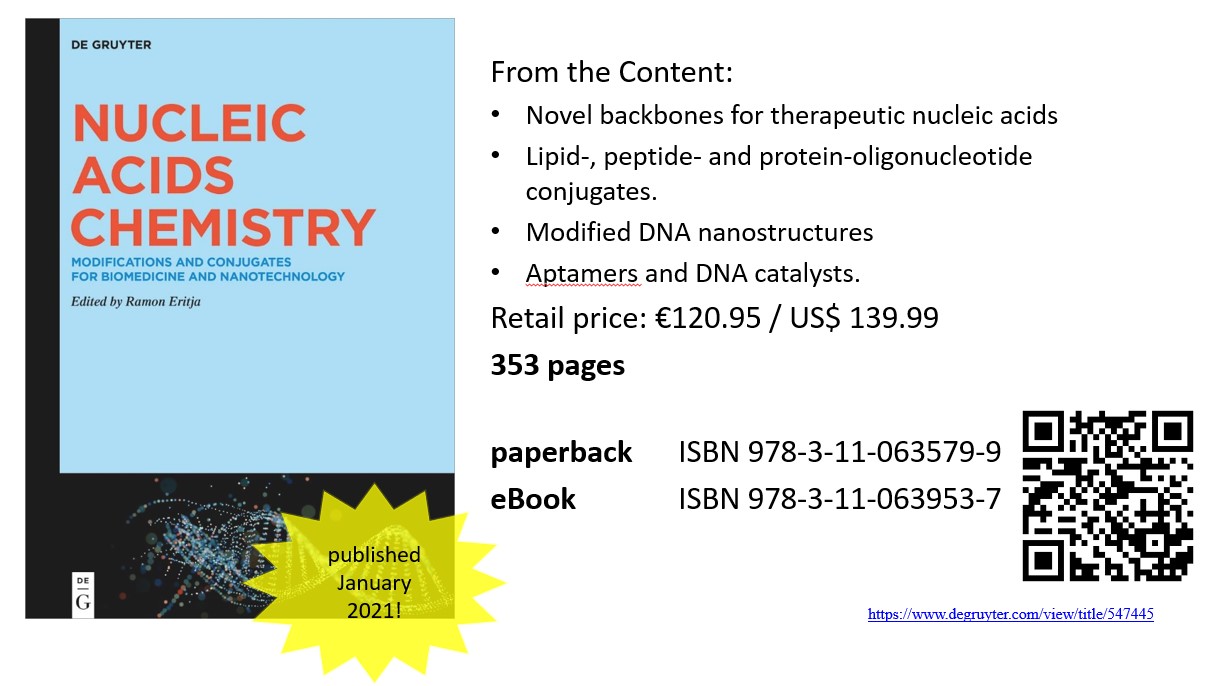Nucleic Acids Chemistry, new book release by Ramon Eritja
Ramón Eritja, Scientific Director of NANBIOSIS Unit 29 Oligonucleotide Synthesis Platform (OSP) has just published a new book “Nucleic Acids Chemistry, modifications and conjugates for Biomedicine and Nanotechnology“, Anna Avinó, Scientific Coordinator of NANBIOSIS Unit 29 is also a writer of the book.
The book “Nucleic Acids Chemistry” takes the most important aspects of the methodology of oligonucleotides synthesis, that is currently expanding by the endorsement of a dozen of new medicines, such as the first medicine based on interfering RNA for the control of LDL and cholesterol in blood that will facilitate the decrease of cardiovascular illnesses.
The writing of the book has been directed by Dr. Ramon Eritja, of Centro de Investigación en Red de Nanomedicina (CIBER-BBN) and is Research Professor at Institute of Advanced Chemistry of Catalonia (IQAC-CSIC), being its director between 2012-2017. The co-authors are Carme Fàbrega, Anna Aviñó, Santiago Grijalvo, Andreia F. Jorge, from IQAC-CSIC, Carlos González from Instituto de Química Física Rocasolano (IQFR-CSIC) and Raimundo Gargallo from University de Barcelona The book began to be written in mid-2019, although most of the book was written during the lockdown.
In the last five years, an expansion of technologies based on DNA and RNA in diagnosis and therapeutic use has been produced, and it has been very important in the research of quick solutions to avoid the COVID pandemic and, predictably, the research group’s environment has led the development of several solutions, like biosensors for the direct detection of SARS-CoV-2.
A former PhD student of Ramon Eritja group, Dr. Ramón Güimil García, Head of Synthetic Oligonucleotides bei BioNTech, has participated in the development of the BioNTech-Pfizer mRNA vaccine. Another doctor, Brendan Manning, formed member of the group, has participated in the development of a diagnosis kit named Sherlock, which uses the CRISPR-Caspasa system for the detection of the virus that causes COVID.
Dr Erija completed his doctoral thesis at the University of Barcelona directed by Dr. Ernest Giralt on the subject of peptide synthesis. In 1984 he carried out his first postdoc with Dr. Itakura at the Beckman Research Institute of City of Hope in Los Angeles where the production of the first synthetic genes was carried out, highlighting the production of synthetic insulin that, with the name of humulin, solved the problems generated from the use of swine insulin. In 1986 she completed the second postdoc with Dr. Caruthers at the University of Colorado at Boulder. In this laboratory, phosphoramidites were developed, which are the reagents used today for the production of synthetic DNA and RNA. Upon his return to Barcelona, he joined the CSIC Research and Development Center where he organized the first research group in our country focused on oligonucleotide synthesis. In 1984 he moved to the European Molecular Biology Laboratory (EMBL) in Heidelberg (Germany) to direct for 5 years one of the most prestigious groups in DNA and RNA Chemistry in Europe. Upon his return to Barcelona, he was part of the Barcelona Institute for Biomedical Research (IRB Barcelona) and was recognized as a group of excellence by the CIBER-BBN. In 2012 he moved to the IQAC-CSIC to occupy the direction of the institute until 2017.
Refernce:
Nucleic Acids Chemistry – Modifications and Conjugates for Biomedicine and Nanotechnology Edited by: Ramon Eritja. De Gruyter | 2021 DOI: https://doi.org/10.1515/9783110639537
The book can be purchased here: link









